In today’s fast-paced world, maintaining a healthy lifestyle and getting enough sleep can often feel like an elusive goal. However, prioritizing your well-being and restorative rest is crucial for overall health and vitality. From adopting a balanced diet and regular exercise routine to implementing effective sleep hygiene practices, there are various strategies and habits you can incorporate into your daily life to ensure you stay healthy and reap the benefits of quality sleep. By making small yet impactful changes, you can achieve a harmonious balance between a vibrant, active lifestyle and the restful sleep your body craves.
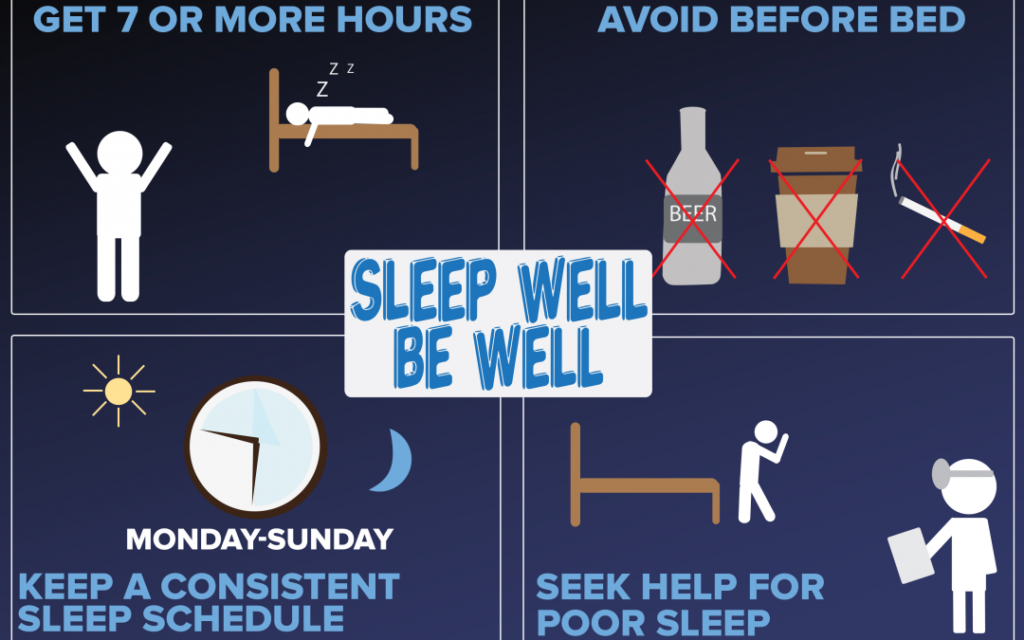
This image is property of unitedfamilymedicine.org.
Importance of Sleep
The role of sleep in maintaining overall health
Sleep plays a vital role in maintaining overall health and well-being. It is during sleep that our bodies undergo crucial processes such as tissue repair, muscle growth, and hormone regulation. Sleep is also essential for the proper functioning of our immune system, cardiovascular system, and nervous system. In addition, adequate sleep allows our brains to process information, consolidate memories, and improve cognitive function, learning, and problem-solving abilities.
The consequences of sleep deprivation
Without enough sleep, you may experience a range of negative consequences. Sleep deprivation can negatively affect your mood, leading to irritability, mood swings, and increased feelings of stress and anxiety. It can also impair your cognitive abilities, making it harder to concentrate, remember information, and make decisions. Lack of sleep can weaken your immune system, leaving you more susceptible to illnesses. Additionally, chronic sleep deprivation has been linked to an increased risk of developing chronic conditions such as obesity, diabetes, and cardiovascular disease.
Recommended amount of sleep for different age groups
The recommended amount of sleep varies depending on age. Infants typically need around 14-17 hours of sleep per day, while preschoolers require about 10-13 hours. School-aged children should aim for 9-11 hours of sleep, and teenagers need between 8-10 hours. Adults, including young adults and older adults, generally need 7-9 hours of sleep each night to function at their best. However, it’s important to note that individual sleep needs may vary, and some people may require more or less sleep to feel refreshed and alert.
Establishing a Sleep Routine
Creating a consistent sleep schedule
One of the most effective ways to ensure a good night’s sleep is by establishing a consistent sleep schedule. Try to go to bed and wake up at the same time every day, even on weekends. This helps regulate your body’s internal clock and promotes better sleep quality. Consistency signals to your brain that it’s time to sleep, making it easier to fall asleep and wake up naturally. Avoid the temptation to stay up late or sleep in, as this can disrupt your sleep-wake cycle and leave you feeling groggy and tired.
Creating a sleep-friendly environment
Creating a sleep-friendly environment can greatly improve the quality of your sleep. Start by making your bedroom a comfortable and relaxing space. Ensure the room is dark, quiet, and at a cool temperature. Consider using blackout curtains, earplugs, or a white noise machine to block out any external disturbances. Also, invest in a comfortable mattress and pillows that provide adequate support for your body. A clutter-free and organized bedroom can help create a calm and restful atmosphere that promotes a peaceful night’s sleep.
Avoiding stimulating activities before bed
Engaging in stimulating activities before bed can make it harder to fall asleep and achieve a restful night’s rest. It’s best to avoid activities such as using electronic devices (smartphones, laptops, tablets) or watching TV close to bedtime. The blue light emitted by these devices can suppress the production of melatonin, a hormone that regulates sleep. Instead, try engaging in relaxing activities before bed, such as reading a book, taking a warm bath, or practicing relaxation techniques like deep breathing or meditation. These activities can help calm your mind and prepare your body for sleep.
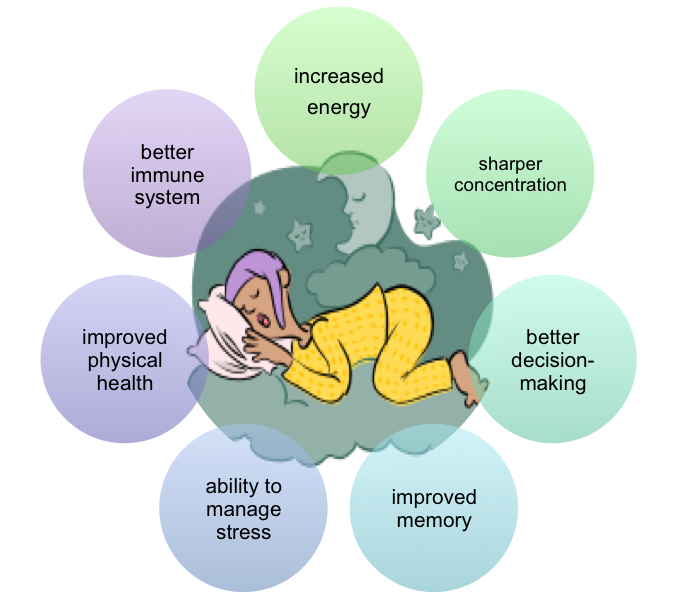
This image is property of www.mankatoclinic.com.
Maintaining a Balanced Diet
Understanding the link between diet and sleep
Your diet can significantly impact the quality of your sleep. Certain foods contain compounds that can either promote or hinder sleep. For example, consuming foods high in tryptophan, an amino acid that promotes the production of serotonin and melatonin, can help improve sleep quality. On the other hand, consuming foods high in sugar, caffeine, or spicy foods close to bedtime can disrupt sleep by causing indigestion, heartburn, or increased wakefulness. It’s important to maintain a balanced diet that includes a variety of nutrient-rich foods that support overall health and sleep.
Foods that promote better sleep
Several foods have been found to promote better sleep. Incorporating these foods into your diet can help improve sleep quality. Foods rich in tryptophan include poultry (such as turkey and chicken), eggs, nuts, seeds, and bananas. Other sleep-promoting foods include complex carbohydrates like whole grains, which can enhance the release of serotonin. Additionally, foods containing magnesium, such as leafy greens, legumes, and nuts, can help relax muscles and promote a sense of calm before bed. Consuming these foods as part of a balanced diet can contribute to better sleep.
Foods to avoid before bedtime
Just as certain foods promote better sleep, there are also foods to avoid before bedtime. It’s best to steer clear of foods high in caffeine, such as coffee, tea, chocolate, and energy drinks, as they can stimulate the nervous system and interfere with sleep. Spicy or heavy and greasy foods can trigger indigestion or acid reflux, leading to discomfort and difficulty falling asleep. It’s also advisable to limit alcohol consumption close to bedtime, as alcohol can disrupt sleep patterns, causing fragmented and restless sleep.
Exercise and Physical Activity
The impact of physical activity on sleep quality
Physical activity has a significant impact on sleep quality. Engaging in regular exercise can help regulate your sleep-wake cycle, promote deeper and more restorative sleep, and reduce the time it takes to fall asleep. Exercise also reduces stress and anxiety, both of which can negatively affect sleep. Additionally, physical activity improves overall health, leading to better sleep. It’s important to find activities that you enjoy and can incorporate into your routine to reap the sleep benefits of exercise.
Choosing appropriate exercises for better sleep
Not all exercises are equally beneficial for sleep. While any form of physical activity is generally better than none, certain types of exercise can be particularly effective in improving sleep quality. Aerobic exercises, such as brisk walking, jogging, swimming, or cycling, help release endorphins and reduce stress, making it easier to unwind and fall asleep. Strength training exercises, like weightlifting or resistance training, also contribute to better sleep by promoting muscle growth and repair. Yoga or other gentle stretching exercises can help relieve tension and promote relaxation before bed.
Timing exercise to optimize sleep
The timing of exercise can also impact your sleep. It’s generally recommended to finish your workout at least a few hours before bedtime to allow your body to cool down and your heart rate to return to normal. Exercising too close to bedtime can leave you feeling energized and make it harder to wind down for sleep. However, some individuals find that gentle stretching or relaxation exercises, such as yoga or tai chi, can be beneficial before bed as they promote relaxation and prepare the body for sleep. Experiment with different exercise times to find what works best for you.
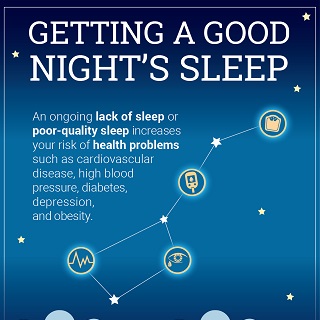
This image is property of www.nia.nih.gov.
Limiting Caffeine and Alcohol Intake
Understanding the effects of caffeine on sleep
Caffeine is a stimulant that can interfere with sleep. It works by blocking adenosine receptors in the brain, which helps keep you awake and alert. Consuming caffeine, whether from coffee, tea, soda, or energy drinks, can lead to difficulty falling asleep, shorter sleep duration, and more fragmented sleep. The effects of caffeine can vary from person to person, but it’s generally recommended to limit consumption, especially in the afternoon and evening, to avoid disrupting sleep.
Establishing cut-off times for caffeine consumption
To ensure better sleep, it’s important to establish cut-off times for caffeine consumption. Ideally, it’s best to avoid consuming caffeine in the late afternoon and evening. Caffeine has a half-life of around 5-6 hours, meaning it takes that amount of time for your body to eliminate half of the caffeine. However, individual sensitivity to caffeine may vary, and some people may need to cut off consumption earlier to prevent sleep disturbances. Opt for decaffeinated versions of your favorite beverages or switch to herbal teas and caffeine-free alternatives in the evening to promote better sleep.
The impact of alcohol on sleep quality
While alcohol may initially make you feel drowsy and help you fall asleep faster, its impact on sleep quality is often negative. Alcohol can interfere with the natural sleep cycle, causing disruptions and poorer sleep quality. It can also lead to increased snoring, sleep apnea, and decreased REM sleep, which is essential for memory consolidation and mood regulation. If you choose to consume alcohol, it’s advisable to do so in moderation and finish drinking well before bedtime to allow your body time to metabolize the alcohol and promote more restful sleep.
Managing Stress and Anxiety
The link between stress, anxiety, and sleep problems
Stress and anxiety can significantly impact sleep quality. When you are stressed or anxious, your brain remains alert, making it harder to relax and fall asleep. The release of stress hormones, such as cortisol, can disrupt your sleep-wake cycle and lead to insomnia or fragmented sleep. Sleep deprivation caused by stress and anxiety can further exacerbate these feelings, creating a vicious cycle. Addressing and managing stress and anxiety is crucial for improving sleep quality and overall well-being.
Implementing stress-reducing techniques
Implementing stress-reducing techniques can help calm your mind and improve your sleep. One effective technique is practicing mindfulness meditation, which involves focusing on the present moment and paying attention to your thoughts and emotions without judgment. This can help quiet racing thoughts and promote relaxation. Other techniques include deep breathing exercises, progressive muscle relaxation, or engaging in hobbies or activities that you find enjoyable and help you unwind. It’s important to find what works best for you and incorporate these techniques into your daily routine.
Creating a relaxing bedtime routine
Establishing a relaxing bedtime routine can signal to your body and mind that it’s time to wind down and prepare for sleep. This routine should include activities that promote relaxation and create a peaceful environment. Consider taking a warm bath or shower, practicing gentle stretching or yoga, writing in a journal to release any thoughts or worries, or reading a book. Avoid engaging in stimulating or stressful activities, such as working or discussing challenging topics, as this can interfere with the relaxation process. Stick to your routine consistently to help train your body to recognize when it’s time to sleep.
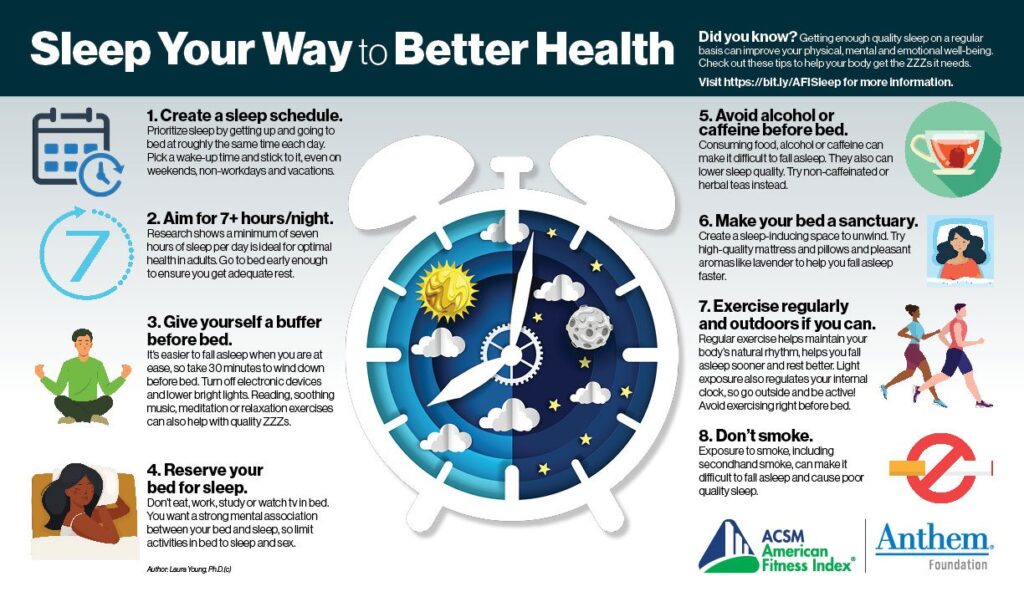
This image is property of americanfitnessindex.org.
Creating an Ideal Sleep Environment
Setting the right temperature and humidity
Creating an ideal sleep environment involves ensuring the right temperature and humidity levels in your bedroom. The National Sleep Foundation recommends keeping your bedroom temperature between 60-67 degrees Fahrenheit (15-19 degrees Celsius) for optimal sleep. This temperature range helps cool your body, which is essential for initiating and maintaining sleep. Additionally, maintaining proper humidity levels, ideally between 30-50%, can prevent discomfort from dry air or excessive moisture, promoting better sleep quality and reducing the likelihood of congestion or respiratory issues.
Investing in a comfortable mattress and pillows
Investing in a comfortable mattress and pillows is essential for a good night’s sleep. Your mattress should provide adequate support for your body, relieving pressure points and aligning your spine. The right mattress and pillows can help alleviate discomfort and promote healthy sleep posture, reducing the risk of aches, pains, or other sleep disturbances. It’s essential to choose a mattress and pillows that suit your individual preferences and needs, whether you prefer a firm or soft surface. Testing out mattresses and seeking expert advice can help you make an informed decision and ensure restful sleep.
Minimizing noise and light disturbances
Creating a sleep-conducive environment involves minimizing noise and light disturbances that can interfere with sleep. Noise disturbances, such as traffic, loud neighbors, or snoring partners, can disrupt sleep or prevent you from falling asleep. Consider using earplugs, a white noise machine, or a fan to mask unwanted sounds and create a peaceful sleeping environment. Similarly, excessive light can interfere with your body’s natural sleep-wake cycle. Invest in blackout curtains or blinds to block out external light sources and create darkness conducive to better sleep.
The Role of Technology in Sleep
Understanding the impact of electronic devices on sleep
Technology, such as smartphones, tablets, and computers, has become an essential part of our daily lives. However, the use of electronic devices close to bedtime can significantly impact sleep quality. The blue light emitted by these devices can suppress the production of melatonin, making it harder to fall asleep and disrupting your circadian rhythm. Additionally, engaging in stimulating activities, such as scrolling through social media or playing video games, can activate your brain and hinder the relaxation process. It’s important to establish boundaries and minimize technology use before bed to optimize sleep.
Establishing screen time restrictions before bed
To minimize the impact of electronic devices on sleep, it’s advisable to establish screen time restrictions before bed. Try to avoid using electronic devices, including smartphones, tablets, or laptops, for at least an hour before you plan to sleep. Instead, engage in calming activities, such as reading a book or practicing relaxation techniques. If you need to use your device, consider using blue light filters or installing apps that reduce the blue light emitted by your screen. Some devices also offer night mode, which shifts the screen to warmer tones that are less disruptive to sleep.
Exploring sleep tracking and relaxation apps
While technology can impact sleep negatively, it can also provide useful tools to track and improve sleep. Sleep tracking apps or wearable devices can help monitor your sleep patterns, providing insights into the duration and quality of your sleep. This information can assist in identifying potential sleep-related issues and improving sleep habits over time. Additionally, there are various relaxation apps available that offer guided meditations, calming music, or soothing sounds to help you unwind and prepare for sleep. Exploring these apps can provide valuable resources to enhance your sleep routine.
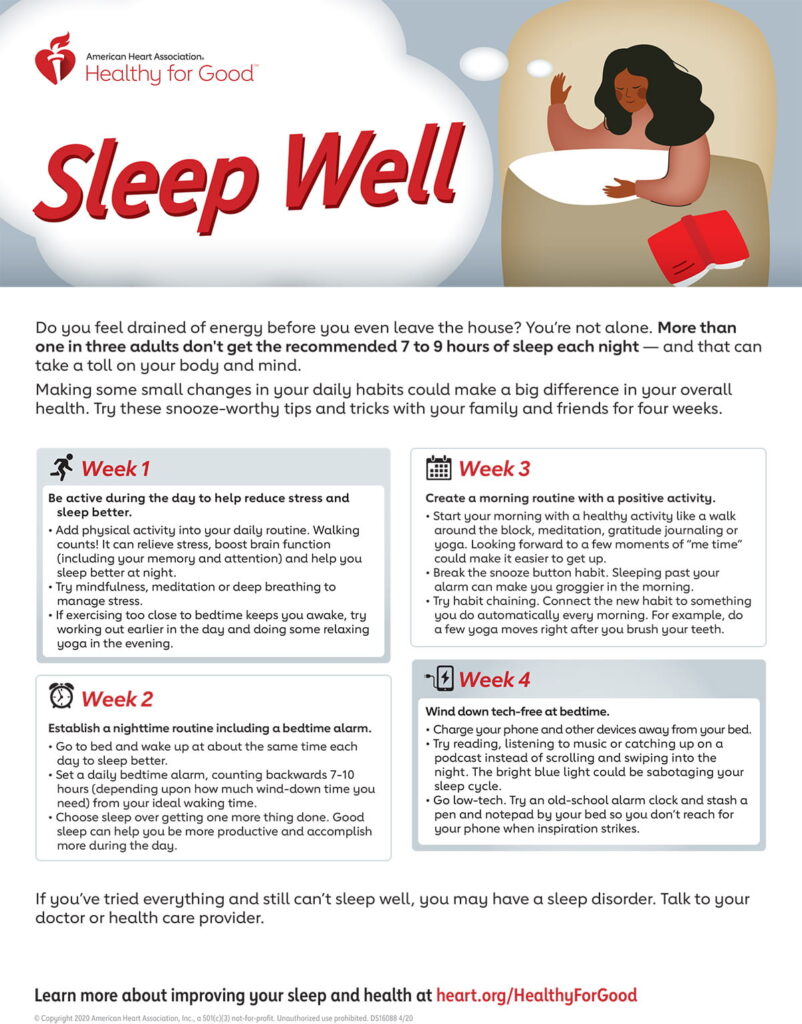
This image is property of www.heart.org.
Implementing Relaxation Techniques
Practicing meditation and mindfulness
Meditation and mindfulness practices are effective relaxation techniques that can promote better sleep. These practices involve focusing your attention and redirecting your thoughts to the present moment, cultivating a sense of calm and relaxation. Meditation can help calm racing thoughts and reduce stress and anxiety levels, making it easier to fall asleep. You can start with short guided meditation sessions or use meditation apps to assist you in building this habit. Consistency is key, and with regular practice, you can experience the sleep benefits of meditation and mindfulness.
Engaging in deep breathing exercises
Deep breathing exercises are another effective relaxation technique to promote better sleep. They help activate the body’s natural relaxation response, reducing heart rate, blood pressure, and inducing a sense of calm. One simple deep breathing exercise involves inhaling deeply through your nose for a count of four, holding your breath for a count of four, and exhaling slowly through your mouth for a count of eight. Repeat this deep breathing pattern for several minutes before bed, focusing on the sensation of breath entering and leaving your body. Deep breathing exercises can quickly soothe the mind and prepare you for sleep.
Trying progressive muscle relaxation
Progressive muscle relaxation is a technique that involves tensing and then releasing different muscle groups in the body to promote relaxation. By consciously tensing and releasing muscles, you can help alleviate physical tension and mental stress, allowing your body to enter a state of relaxation. Start by tensing and releasing your toes, gradually working your way up to your legs, abdomen, arms, and face. Focus on the feeling of tension and release with each muscle group. This technique can help release any built-up tension from the day and prepare your body for a peaceful night’s sleep.
When to Seek Professional Help
Recognizing signs of chronic sleep deprivation
Chronic sleep deprivation can have significant impacts on your health and well-being. It’s important to recognize the signs and symptoms that may indicate a need for professional help. Some signs of chronic sleep deprivation include excessive daytime sleepiness, difficulty concentrating, frequent mood swings, irritability, and difficulty staying awake during quiet activities or while driving. If you consistently experience these symptoms despite practicing good sleep habits, it may be advisable to consult a healthcare professional for further evaluation and guidance.
Understanding the importance of consulting a healthcare provider
Consulting a healthcare provider is crucial if you’re experiencing ongoing sleep problems or suspect you may have a sleep disorder. While incorporating healthy sleep habits is beneficial for most individuals, some sleep-related issues might require professional intervention. A healthcare provider can help assess your specific situation, provide a diagnosis, and recommend appropriate treatment options. They may refer you to a sleep specialist or recommend sleep studies to better understand your sleep patterns. Seeking professional help ensures that you receive the proper care and guidance to address any underlying sleep concerns effectively.
Exploring treatment options for sleep disorders
Sleep disorders, such as insomnia, sleep apnea, restless legs syndrome, or narcolepsy, may require specific treatment options. Treatment strategies for sleep disorders vary depending on the underlying condition. For example, treating insomnia may involve cognitive-behavioral therapy (CBT) techniques, while sleep apnea may require the use of continuous positive airway pressure (CPAP) devices. Restless legs syndrome can be managed through medication adjustments or lifestyle modifications. Exploring treatment options with a healthcare provider or sleep specialist is crucial for improving sleep quality and managing sleep-related disorders effectively.
In conclusion, prioritizing sleep is essential for maintaining overall health and well-being. By understanding the role of sleep in our bodies, establishing a consistent sleep routine, maintaining a balanced diet, engaging in physical activity, limiting caffeine and alcohol intake, managing stress and anxiety, creating an ideal sleep environment, being mindful of technology use, implementing relaxation techniques, and seeking professional help when needed, you can optimize sleep quality and enjoy the many benefits of a good night’s rest. Remember, your sleep matters, so make it a priority in your daily life.
